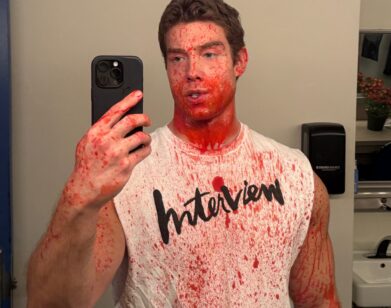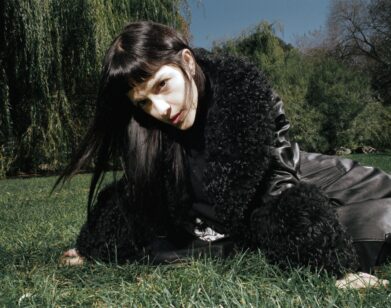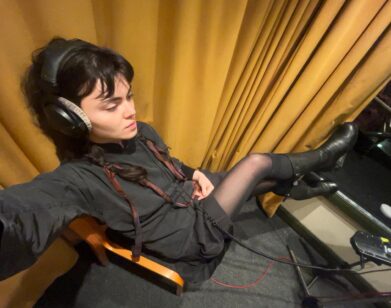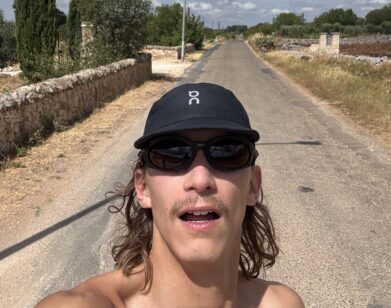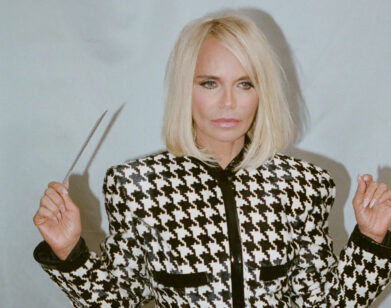Regina King’s Primetime
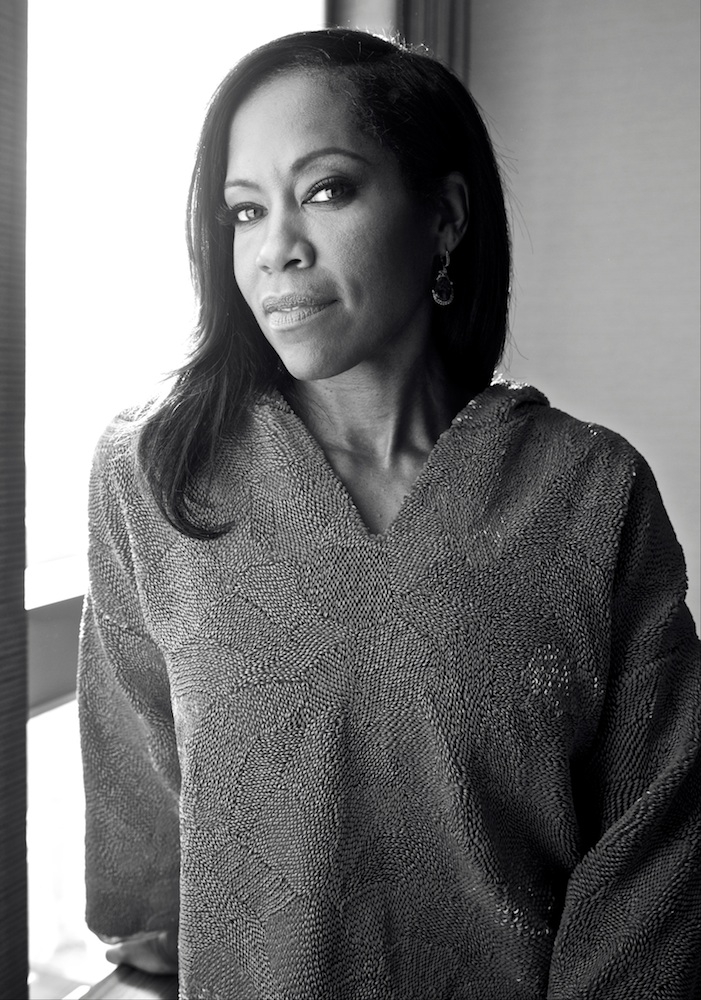
REGINA KING IN NEW YORK, NOVEMBER 2015. PHOTO: FRANK SUN. HAIR: YVETTE SHELTON. MAKEUP: OSLYN HOLDER. WARDROBE: TREVIAN KUTTI.
On October 14, 2014, two percent of the world’s population disappeared instantaneously. No gender, ethnicity, age, or nationality was spared; killers, rapists, and philanderers vanished alongside children and the Pope. The best explanation is some sort of biblical rapture—though few agree on which higher power was responsible.
This is the premise of HBO’s drama The Leftovers, which is currently mid-way through its second season. Based on the novel of the same name by Tom Perrotta and helmed by Perrotta and Lost‘s Damon Lindelof, The Leftovers exhausted its original source material at the end of the last season. It was difficult to know what to expect from Season Two: The show’s two main antagonists—the leader of the local chapter of the Guilty Remnant cult Patti Levin (Ann Dowd) and the self-proclaimed messiah Holy Wayne (Paterson Joseph)—had both been killed; the prodigal son (Chris Zylka) had returned; and it seemed like things might just work out between protagonist Kevin Garvey (Justin Theroux) and his semi-girlfriend Nora Durst (Carrie Coon).
Fortunately, the second season is perhaps stronger than the first. Nora, Kevin, Kevin’s daughter Jill (Margaret Qualley), and Nora’s brother Matt (Christopher Eccleston) have left Mapleton, New York and its residents behind for Jarden, Texas. Their new hometown is a peculiar one; of the town’s 9,261 residents on October 14, 2014, not a single one disappeared. It is the only known settlement with a population of over 5,000 to have survived “the departure.” Now it is known as “Miracle, Texas,” a state park enclosed by chain link fences and thousands of pilgrims camping outside the gates. The residents of Jarden have mixed feelings about their miracle. Even within the Murphy family, Kevin and Nora’s new next-door neighbors, there is a divide. Son Michael prays furtively ever day and father John takes it upon himself to physically punish any resident he feels is exploiting the town’s reputation—through religion or other means. The most mysterious of the Murphy’s is perhaps mother Erika. Played by Regina King, we know that Erika is deaf, a doctor, and that, for some reason, she puts up with her husband’s vigilante actions wordlessly and will occasionally sneak off to the woods to check on a series of birds she has buried in a box. In last week’s episode, however, some of Erika’s thoughts were finally revealed.
2015 has been a rather momentuous year for King. The Southern California native won an Emmy for her role in John Ridley‘s American Crime and directed several primetime television episodes, including an episode of Shona Rhimes’s Scandal. Now 44, King began her career on the television series 227 (her first-ever professional audition) in the mid-1980s before moving on to films like Boyz n the Hood (1991), Friday (1996), Jerry Maguire (1996), and Ray (2004). From 2009 to 2013, she starred as a detective on the drama Southland, a role she found particularly difficult to leave behind “because it was such an amazing experience and we didn’t want it to end.” In addition to The Leftovers and the second season of American Crime, King is also directing episodes of Shonda Rhimes’s new show The Catch and Oprah Winfrey’s series with Lionsgate.
EMMA BROWN: How did you get involved in The Leftovers?
REGINA KING: They reached out to me to check my interest in wanting to join Season Two. They sent me the script for the first episode, and I thought the script was amazing and I felt like it had potential to live on it’s own, even without the first season. I was also a really huge fan of Damon’s.
BROWN: Had you been watching the first season?
KING: I had not been watching the first season. I watched Lost. They told me that if I was interested after reading the script, that I would have a sit down with Damon and Tom. I just was anxious to hear about what they had in store for Season Two because they let me know that Season One was pretty much the book from beginning to end. I wanted to see what their ideas were for life after. I already had an idea from reading the script; I wanted to know where they wanted to go.
BROWN: Did they give you Erika’s entire arc?
KING: No. They told me was that Erika is definitely the matriarch of her family and she’s going to have a wild ride, like all the characters in the previous season. That was exciting to me.
BROWN: Did you learn anything about Erika or her past that shocked you as the season went on?
KING: Have you seen [episode] 206? There were things that I read that kind of shocked me—finding out that I was planning on leaving my family was pretty shocking.
BROWN: How do you deal with something like that—an anecdote or experience that you hadn’t worked into your idea of the character? Does it upset you?
KING: Initially it’s kind of upsetting: “No. The creators got this wrong. This character wouldn’t do that. I didn’t see that coming.” But you have to realize that it is a character and you have to walk away from it for a bit and come back and approach it as an actor. In this particular circumstance I was like, this is an opportunity to explore a woman that I know exists. The few instances I’ve heard of women leaving their families, I’m always like, “How can a mother do that?” So I got the opportunity to explore a person who I’ve always questioned their intentions.
BROWN: Do you feel more empathy towards those people now?
KING: Absolutely I do. I still don’t know how that could happen, but I can only imagine that it must be a heartbreaking choice to make and operating from a place of heartbreak is something that we’ve all felt. Whether it’s from losing a loved one, from breaking up in relationship, we’ve all experienced heartbreak.
BROWN: Do you always create a backstory for your character? Or does it depend on how much background they give you?
KING: I create my own backstory regardless of if I’m told something about the background or not. There’s always more that you can develop in your head that makes a character more layered, more honest. It may not ever be information that’s said, but I think it informs my performance if I’ve created a previous experience for that character. Then I can work inside the boundaries of Erika Murphy, or whoever the character is. It’s fun to create somebody that’s not you, that doesn’t exist.
BROWN: You’ve started directing recently as well. When did you first become interested in directing?
KING: Probably 12 or 13 years ago, as far as realizing that it’s something I might be interested in doing. I started actually directing about five years ago.
BROWN: What made you wait seven years?
KING: Two things. I recognize the amount of time that it takes as a director. I made the choice to stop taking roles outside of L.A. because I didn’t want to miss any of my child’s life. I knew that if I tried to embark on a career as a director, I might as well have continued to take roles outside of the city. It just wasn’t time to do that yet. Also the fear that I would be regarded as a person that’s only doing this because of vanity, not because it’s an opportunity for me to exercise another muscle or express my creativity in another way.
BROWN: How did you get involved with directing episodes of Scandal?
KING: I actually applied for the ABC directing program, got in, and shadowed on shows. I shadowed on Private Practice and met Shonda [Rhimes]. Mark Tinker on Private Practice introduced me to Tom Verica, who’s the producing director on Scandal, we had a really good conversation and he brought me back to shadow him and he kind of put his stamp on thinking that I could do it. Shonda had already been a cheerleader.
BROWN: Do you feel like winning an Emmy has changed things for you?
KING: It still remains to be seen. There are more incoming calls, but I’ve always been selective about materials I choose anyways. The incoming calls haven’t been projects that I necessarily want to do. Now I can always be called “Emmy winner Regina King.” I think that in this business, it must mean something. Every times someone has won an award and they’re announcing them or speaking about them, that prefaces their name.
BROWN: When you first signed onto American Crime, did you know they wanted to do a second season and make it an anthology series?
KING: No. I think they were waiting to find out if ABC was going to pick it up again. I’m sure there were some ideas of what he would do if there was a season two, but the conversations didn’t start about that until it got picked up. I knew that if it was picked up, it would be a totally different setting and they would bring back some of the same actors.
BROWN: John Ridley must have written your Season Two part with you in mind—can you tell? Does it feel different?
KING: It feels different because of the setting. The work ethic is the same, but the setting and who we are—the characters that we’re playing—it’s very different.
BROWN: John Ridley seems like a lovely person.
KING: He really is. He’s able to set a really professional tone on set and he inspires you to want to be better because he’s just so good. He does it without using the iron fist; he does it in a truly elegant way.
BROWN: Do you ever go back and watch your past performances?
KING: No. I’m one of those people where if I go back and look at it, I’m going to feel like, “I wish I would have…” I need to just leave it on the floor. What’s done is done. We play different people—our art form is performance art—so unless you’re playing the same type of person, I don’t know if you could improve or make it worse. Unless it’s theater, that’s a little different.
SEASON TWO OF THE LEFTOVERS AIRS SUNDAYS ON HBO.

